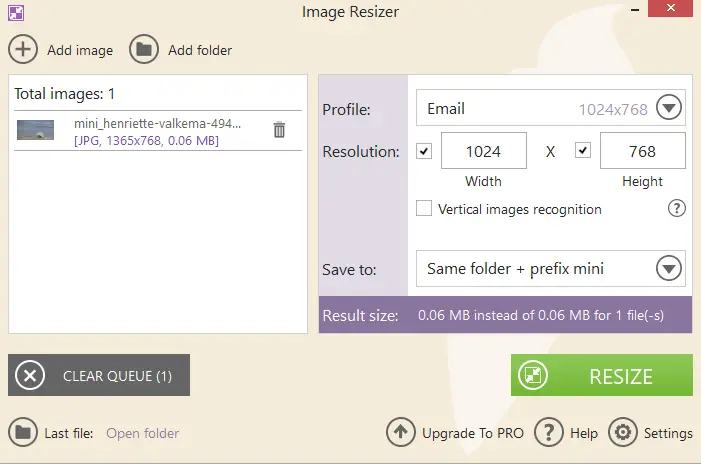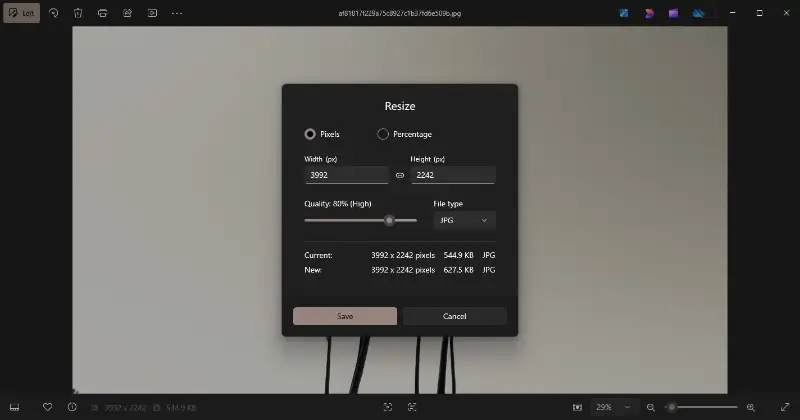How to Resize an Image Without Losing Quality
Resizing images is a common practice when working with digital content. It helps optimize the visuals for different purposes such as printing or web use. When done properly, it allows one to maintain the original integrity of the picture, ensuring that it still looks clear and crisp.
Changing the image's dimensions enables one to reduce the file size without compromising on the overall quality. This is especially useful when working with limited storage space or slow internet speeds.
In this article, you will see 4 ways to resize an image without losing quality on a Windows computer, on a macOS device, and online.
Icecream Image Resizer
Many individuals face difficulties in maintaining the quality of an image while resizing, particularly when working on design or photography projects. Luckily, with the help of Icecream Image Resizer, this task can be easily achieved.
How to resize an image on Windows with Icecream Image Resizer
- Install the Windows picture resizer on your computer.
- Launch the program and hit "Add image to resize" to select the photo you want to alter.
- From the "Profile" dropdown menu, choose your preferred output format. You can also adjust the size settings for your image manually.
- Press the "Resize" button to initiate processing.
- Once the image is ready, the app will notify you. Click "Open folder" to navigate to the resized file's location on your computer.

Benefits of using Icecream Image Resizer:
- Maintains Quality. The image resizing software uses advanced resizing algorithms, ensuring that the quality remains intact.
- Supports Multiple Formats. A wide range of formats can be processed with the app, making it a versatile tool for any project.
- Batch Resize. Users can resize multiple images at once, saving time and effort.
- Easy to Use. The photo resizer has a simple interface, so it's quick for anyone to use without any special skills or knowledge.
- Various Settings. It provides a range of resizing choices, including custom, by percentage, by dimensions, etc., giving you the flexibility to choose the one that best fits a particular need.
- Custom Output Naming. Offers the ability to define name templates, making it easier to manage and identify files later.
In conclusion, Icecream Image Resizer is a reliable and efficient program for rescaling pictures without losing their quality. So, next time you need to change the dimensions of a photo, give this software a try and see the difference for yourself.
Preview
To resize an image on a Mac without compromising the quality is possible even without a third-party picture resizer. To maintain the sharpness and clarity of your photo, while resizing use Preview, a default program on macOS devices.
How change image resolution on macOS in Preview
- Begin by opening the picture within the image resizing software.
- Navigate to the "Tools" menu and opt for the "Adjust Size" option.
- In the ensuing window, pick a preset size from the "Fit into" dropdown menu. Alternatively, input specific Width and Height values manually. They can be in pixels, percentages, inches, or other units.
- Once you've set the desired parameters, click "OK" to apply the changes to the original image.
(1).webp)
Pros:
- Quick and easy process of resizing images.
- No need for third-party applications.
- Maintains the original aspect ratio.
- Can modify both dimensions and pixel density.
- Supports various measurement units.
Cons:
- No batch image resizing option.
In summary, Preview is a reliable free image resizer that allows you to adjust the size and resolution, giving you control over the final result. Although not batch resizing is possible, it will still come in handy for a variety of simple tasks.
Image Candy
To avoid the hassle of getting a new application on your device or when in need of processing digital pictures on the go, try out an online image resizer. Image Candy is a powerful yet easy-to-use web-based platform that offers many tools for editing images for free without losing their quality.
How to resize an image online with Image Candy
- Open the website in your browser. Select the "Resize Image" online tool.
- Utilize the "+Add file(s)" button to upload the pictures you wish to resize.
- Choose between the "Pixels" and "Percents" tabs. Select your preferred settings from the suggested options or input custom values.
- When you're ready, click "Resize Image" and wait for the processing to complete.
- Finally, hit "Download file" to save the modified image to your device.

Pros:
- Quick solution to resize pictures online.
- No costly programs are needed, free image resizer.
- Works on any device.
- Offers more tools than just resizing.
- Supports drag-and-drop uploads for fast access.
Cons:
- Dependable on the internet connection.
Photos
Altering picture dimensions on Windows can be done effortlessly using the default Photos app. This built-in tool allows you to modify visuals without relying on external software, while preserving overall clarity.
How to resize an image on Windows using Photos
- Open the file by double-clicking it or selecting "Open with" > "Photos" from the right-click menu.
- Hit the three-dot icon in the upper-right corner and choose "Resize image" from the list.
- Input the desired Width and Height in pixels. Then press "Save" to export the adjusted version.

Pros:
- Pre-installed on all Windows devices.
- User-friendly layout for quick edits.
- Keeps the original file untouched.
Cons:
- No batch processing capability.
Tips for no quality-loss image resizing
- Use a reliable image resizer with good reviews and from trusted developers.
- Save a copy of the original picture in case you need to revert to it.
- When resizing, always maintain the aspect ratio of the image to avoid distortion.
- If possible, resize the image by a small percentage (e.g. 10%) at a time instead of drastically changing its size.
- Consider lossless file formats like PNG or TIFF when saving your resized pictures to preserve their quality.
- Pay attention to the resolution of the image when resizing for print (300 PPI) or digital use (72 PPI).
- Try out various tools and compare their outcomes to determine the optimal one for your specific picture.
- Avoid resizing images multiple times as it can lead to a significant loss of quality.
FAQ
- Why does changing image size lead to loss of quality?
- When a picture is enlarged, the software must create new pixels based on existing ones, which can result in blurriness or pixelation. Conversely, reducing an image too much can cause loss of detail.
- What is pixel interpolation?
- It is the process used to estimate new pixel values when resizing images. Common methods include nearest neighbor, bilinear, and bicubic interpolation.
- What is the significance of DPI (Dots Per Inch)?
- DPI is crucial for print quality. Standard resolution is typically 300 DPI. When resize pictures for print, ensure that the image retains this DPI to avoid pixelation. If you reduce the size without adjusting the DPI accordingly, the result will appear less sharp.
- What is content-aware scaling, and how can it in image resizers?
- It is an advanced technique that intelligently adjusts the size of pictures while preserving important content. This tool analyzes the graphics and keeps significant details intact.
- Can vector images be resized without losing quality?
- Yes, unlike raster pictures, which are made of pixels, vector ones use mathematical equations to represent shapes, allowing them to be resized infinitely without any loss of clarity or detail.
Conclusion
In conclusion, learning how to resize an image without losing quality is helpful for producing good content and visuals. This task can be accomplished with the proper tools and techniques.
Bear in mind, that changing the dimensions of your pictures without sacrificing their quality calls for patience and a keen eye for detail. But by following the suggestions outlined in this article, you can ensure that your images maintain their sharpness and clarity no matter their size.


